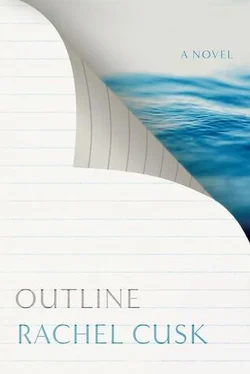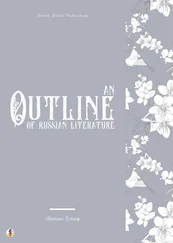It was interesting to consider, Georgeou said, that the role of the artist might merely be that of recording sequences, such as a computer could one day be programmed to do. Even the question of personal style could presumably be broken down as sequential, from a finite number of alternatives. He sometimes wondered whether a computer would be invented that was influenced by its own enormous knowledge. It would be very interesting, he said, to meet such a computer. But he sensed that any system of representation could be undone simply by the violation of its own rules. He himself, for instance, leaving the house this morning had noticed, perched on the verge beside the road, a small bird that could only have been described as being lost in thought. It was gazing at something in that unfocused way one observes in people trying, for example, to work out a mathematical problem in their heads, and Georgeou had walked right up to it while it remained completely oblivious. He could have reached out and grabbed it with his hand. Then, finally, it noticed he was there and nearly jumped out of its skin. He did have some concerns about that bird’s capacity for survival, however. His own story, he added, was based entirely on his personal experience, and described in detail a conversation he had had with his aunt, who was researching mutations in certain particles at a scientific institute in Dubai. His only invention had been the addition of a lizard, which had not been there in reality, but which in the story his aunt kept tucked safely under her arm while they spoke. He had showed the story to his father, who had confirmed that all the details were accurate, and who said he had enjoyed witnessing the conversation, whose subject interested him, for a second time. He described the lizard, if Georgeou remembered the phrase correctly, as a nice touch.
Sylvia said she had written nothing at all. Her contribution yesterday, if I recalled, had in fact concerned an animal, the small white dog she had seen perched on the shoulder of the tall dark man. But after the others had spoken she wished she had chosen something more personal, something that would have allowed her to express an aspect of her own self, rather than a sight that was asking, as it were, to be seen. She had looked out for that man again on the train home, as it happened, feeling that she had something to say to him. She wanted to tell him to take the dog off his shoulder and let it walk, or better still get a dog that was ordinary and ugly, so that people like her wouldn’t feel so distracted from their own lives. She resented him for his attention-seeking behaviour and for the fact that he had made her feel so uninteresting; and now here she was, mentioning him in class for the second time!
Sylvia had a small, pretty, anxious face, and great quantities of ash-coloured hair worn in maidenly rolls and tresses — which she touched and patted frequently — around her shoulders. In any case, she continued, she obviously didn’t see him again on the way home, because life wasn’t like that: she returned to her apartment, which since she lives alone was exactly as she had left it that morning. The telephone rang. It was her mother, who always phones her at that time. How was school today, her mother wanted to know. Sylvia works as a teacher of English literature, at a school in the suburbs of Athens. Her mother had forgotten she had the week off to do the writing course. ‘I reminded her of what I had been doing,’ Sylvia said. ‘Of course, my mother is very sceptical about writing, so it’s typical that she wouldn’t remember. You should have gone on holiday instead, she said, you should have gone out to one of the islands with some friends. You should be living, she said, not spending more time thinking about books. To change the subject I said to her, Mum, tell me something you’ve noticed today. What would I have noticed? she said. I’ve spent all day in the house, waiting for the man to come and fix the washing machine. He never even turned up, she said. After our conversation I went and looked at my computer. I had set my students an essay assignment, and the deadline had now passed, but when I checked my emails I saw that not a single one of them had sent the essay. It was an essay about Sons and Lovers by D. H. Lawrence, the book that has inspired me more than anything else in my life, and none of them had a single word to say about it.
‘I went and stood in my kitchen,’ she continued, ‘and thought about trying to write a story. But all I could think of was a line describing the exact moment I was living in: a woman stood in her kitchen and thought about trying to write a story. The problem was that the line didn’t connect to any other line. It hadn’t come from anywhere and it wasn’t going anywhere either, any more than I was going anywhere by just standing in my kitchen. So I went to the other room and took a book off the shelf, a book of short stories by D. H. Lawrence. D. H. Lawrence is my favourite writer,’ she said. ‘In fact, even though he’s dead, in a way I think he is the person I love most in all the world. I would like to be a D. H. Lawrence character, living in one of his novels. The people I meet don’t even seem to have characters. And life seems so rich, when I look at it through his eyes, yet my own life very often appears sterile, like a bad patch of earth, as if nothing will grow there however hard I try. The story I started to read’, she said, ‘was called “The Wintry Peacock”. It is an autobiographical story,’ she said, ‘in which Lawrence is staying in a remote part of the English countryside in winter, and one day when he is out on a walk he hears an unusual sound and discovers that it is a peacock trapped out on the hillside, submerged in the snow. He returns the bird to its owner, a strange woman at a nearby farm who is waiting for her husband to return home from the war.
‘At this point,’ she said, ‘I stopped reading: for the first time, I felt that Lawrence was going to fail to transport me out of my own life. Perhaps it was the snow, or the strangeness of the woman, or the peacock itself, but suddenly I felt that these events, and the world he described, had nothing to do with me, here in my modern flat in the heat of Athens. For some reason I couldn’t bear it any longer, the feeling that I was the helpless passenger of his vision, so I closed the book,’ she said, ‘and I went to bed.’
Sylvia stopped speaking. My phone rang on the table in front of me. I saw the number of Lydia at the mortgage company flashing on the screen, and I told the group that we would take a short break. I went out and stood in the corridor among the notice-boards. My heart was beating uncomfortably in my chest.
‘Is that Faye?’ Lydia said.
Yes, I said.
She asked me how I was today. She could hear from my dial tone that I was abroad, she said. Whereabouts are you? Athens, I said. That sounds nice, she said. She was sorry she hadn’t been in touch earlier. She’d been out of the office the last couple of days. A few of them in the department had been given some corporate seats for Wimbledon: yesterday she’d watched Nadal get knocked out, which was a big surprise. Anyway, she hoped it wasn’t going to spoil my holiday, but she had to tell me that the underwriters had rejected my application to increase my loan. They don’t need to give a reason, she said, when I asked her why. That was just their decision, based on the information they were provided with. As I say, she said, I hope it won’t affect your holiday too much. When I thanked her for calling to tell me, she said it had been no problem at all. I’m sorry it couldn’t have been with better news, she said.
I moved along the corridor and through the glass front doors at the entrance to the building and out into the ferocious heat of the street. I stood there in the glare while the cars and people passed, as though I was expecting something to happen or for some alternative to present itself. A woman in a polka-dot sun hat with an enormous camera hung on a strap around her neck asked me the way to the Binyaki Museum. I told her and then I returned inside and went back to the classroom and sat down. Georgeou asked me if everything was all right. He had noticed, he said, that I had closed the door, and wondered if that meant I now wanted the windows to be opened. He was happy to perform that service if so. I told him to go ahead. He bounded out of his chair with such eagerness that he knocked it backwards. Surprisingly deftly, Penelope shot out her hand to catch it, and set it carefully back on its feet. She had been certain, she said somewhat enigmatically, that she would have nothing whatsoever to bring to class today, except her dreams, which were often so lurid and strange she thought she ought to tell someone about them. But generally speaking it was not possible, she had accepted after yesterday’s class, for a person in her position to be a writer, someone whose time was not their own. And so she had spent the evening in the way she usually did, cooking dinner for her children and ministering to their ceaseless demands.
Читать дальше












